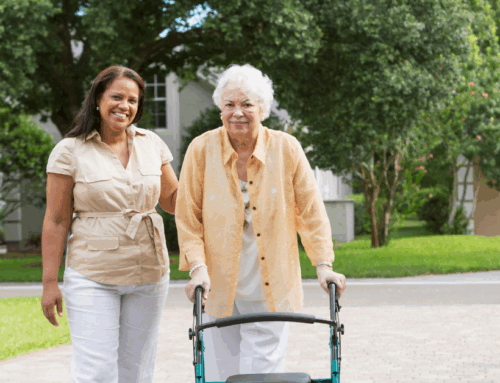Continuing our series of FLORIDA FIRST SHC actual case histories with our clients and their corresponding caregiver and what actually happened…here’s our report.
THE CLIENT: An 80-year-old client “snowbird” who had just moved down to Palm Beach County in Florida into her 2600 square-foot villa.
THE CAREGIVER: A 29-year-old “young” caregiver who had dealt with dementia clients over the past three years.
WHAT HAPPENED: On the very first day of their relationship, the client told the caregiver to scrub the entire home thoroughlyand to do it each day of the week.
RESULTS: The caregiver reminded the dementia client that she was not a housekeeper but a caregiver and that she could not “scrub” the house if she were to take care of the client for which she was engaged. If she wanted a “housekeeper,” then she had to hire one. She would do light dusting and the appropriate “caregiving” as she was trained to do. She had to repeat the discussion every day until the client finally understood what was going on. She eventually hired a housekeeper on a weekly basis to “scrub” the home.
Here’s the Third column for your every-other-week blog on your website
ADVICE & REORTS FROM VARIOUS CARING RESOURCES
AND ACTUAL EXPERIENCES FROM PRACTICING CAREGIVERS
We came across some poems aimed especially for caregivers,
and are reproducing one of them for your enjoyment:
CAREVERSES
by Lin M. Watkins
“I AM A CAREGIVER”
It’s what I do
24/7, I’m here for you.
And most of the time
We do just fine.
But once in a while,
I need my own time.
And when I take
that necessary break
I’ve got to remember
It’s for both our sake.
I can’t take care of you
unless I take care of me.
So I work very hard
at being guilt-free.
I’ll always be here for you
so don’t you fret.
Together we’re making
memories of us I’ll never forget.
From Today’s CareGivers.com, 2/5/15
Continuing our series of FLORIDA FIRST SHC actual case histories with our clients and their corresponding caregiver and what actually happened….here’s our next report.
THE CLIENT: A 76-year-old widow with the beginning of dementia who could forget some things which happened months before. She claimed to have something stolen from her that was very valuable and was very upset about it since she hinted that it was the caregiver who had stolen this valuable broach. The caregiver continued to deny any wrongdoing, even when the police came to question her regarding the claimed theft.
THE CAREGIVER: This particular person had been working with the client for a few years and had never been cited as a “thief.” She was visibly upset with her client and continued to deny having anything to do with the crime. It was a very tense situation for both of them.
WHAT HAPPENED AFTERWARDS: The following week after the police had investigated, the client and caregiver were sitting in the living room, but they were very intense with one another and talked very little. Finally after about an hour of this intense situation, the client said, “Oh, my gosh, now I remember what happened with my valuable broach and why I thought you had anything to do with it. I told you I had just found the broach in my drawer and wanted to protect it from anyone entering my home and suggested that we hide it together. That’s when you and I hid the broach in one of my suits in the closet and old one to be sure, but one I truly liked.”
“So we went over to the closet, found the suit and hid the broach inside the lining, but never did sew it up. When I went looking for it a month later, now I know what happened and am truly sorry for believing you took it since we were the only ones who knew where the broach was hidden.
“The truth is, now that I remember, is that my daughter came over a few weeks ago and said to me, ‘Mother, you have way too many clothes in your closet and some of them smell pretty bad considering they are probably 25-50 years old. I think we should give them to some non-profit group so they can sell them and make some money for the group.” I thought it was a good idea.
A week later I received a call from this non-profit group who said they would be here the following day to pick-up the clothes we had selected to donate., around noon they said.” They came and we felt good after their pick-up that we were helping a good cause. I didn’t realize at that time they picked up the suit which contained my valuable broach in the lining. It was a mistake, but remember my daughter didn’t know what we did. Oh, well, someone will eventually find the broach and realize that they were very fortunate. So I do apologize for what we both went through and I still love you!”
The caregiver accepted the apology and they went on living together will all the love they had for each other before this terrible situation. Other situations concerning money disappearing have been heard before. Fortunately, this one worked out to a happy ending.
Here’s the second column for our every-other-week series (You have the first one I sent on Jan. 23) using Carmen as the Caregiver.
ADVICE FROM CARING
& OTHER SOURCES FOR AGING SENIORS
…AND ACTUAL EXPERIENCES FROM PRACTICING CAREGIVERS
Contrary to popular belief, falls are not a natural part of aging. They are highly preventable especially
when you are living alone and can readily make a difference of improving your health by reducing your risk of falling says Emma Harrington, director of injury prevention and education services at a Georgia Center.
Here are some tips to prevent falls as supplied by the U.S. Centers for Disease Control and Prevention:
1- Keep moving by exercising regularly. Focus on building leg strength and improving balance. Check around for tai chi programs that are considered beneficial. Also check with local senior citizen programs to see if classes are offered.
2- Are your meds making you unsteady? Ask your doctor or pharmacist to review your medications–prescription and over the counter–to see which might cause dizziness or drowsiness. It might be interaction between drugs.
3- Have your eyes checked at least once a year and update your eyeglasses to maximize your vision. Consider getting a pair with single-vision distance lenses for some activities such as walking outside.
4- Make your home safer by reducing tripping hazards, adding grab bars inside and outside the tub or shower and next to the toilet, adding railings on both sides of stairways and improving the lighting in your home.
5- Be aware that as you age, your reflexes might not be as sharp as they once were.
6- If you feel dizzy or unsteady, be sure to tell your physician. A checkup might be necessary.
7- Wear shoes that give you more support and aren’t likely to cause you to slip or fall.
8- When getting out of a chair or bed, sit then stand. Don’t try to walk for a few seconds. Give your body time to adjust.
Continuing our series of FLORIDA FIRST SHC actual case histories with our clients and their corresponding caregiver and what actually happened, here is our next report.
THE CLIENT: This particular 75-year-old woman, living alone in her home, had a slight case of dementia and would often forget what she observed. In this particular case, she claimed her laundry was not being done and she didn’t want to sleep on soiled linen. She called our office to complain. We immediately contacted the current caregiver to communicate her client’s complaint, who said the work was being done. We called to inform the women that the caregiver stated that her laundry was being done. She, however, disagreed. We asked her what she wanted to do. She requested that we refer a one-day replacement caregiver to calm her fears.
THE CAREGIVER: This particular replacement caregiver who accepted a referral to the complaining client had been working with clients through our nurse registry for many years and worked specifically with dementia clients, so she was very experienced handling such individuals.
WHAT HAPPENED: The following day, the substitute caregiver arrived at the client’s home telling her that she was filling in for her regular caregiver who had an emergency and had to take the day off. The caregiver took care of her usual routine by asking the client exactly what she had to follow.
After picking up the routine quickly, she next asked the woman about her laundry. The women told her that the caregivers were not doing it. The caregiver immediately soothed the women down and said that most of her fellow caregivers usually never forget to do laundry. In fact, she took the soiled laundry, led the woman by hand to the washing machine and asked her to put them into the machine; she then guided her hands through the set-up process and made sure she remembered what was done. “You should do this every day with your regular caregiver(s) if you wish so that you’ll be sure the laundry was done.”
It worked. The woman later informed the registry that she was happy once again because she knew the laundry was being done since she and the caregiver did it together. There usually is a way to help dementia clients calm their fears!.
Next Edition. The Case of the Missing Money…a usual problem between caregivers and their clients.
Find the best home health caregivers in Delray Beach FL.




